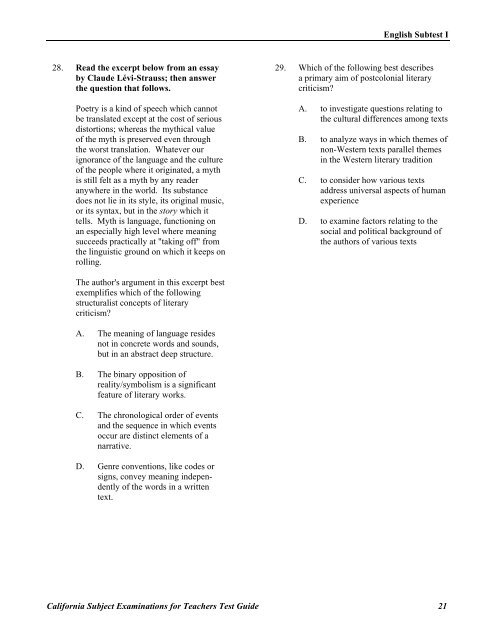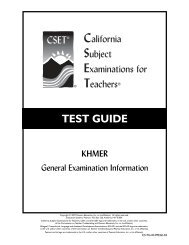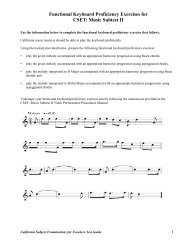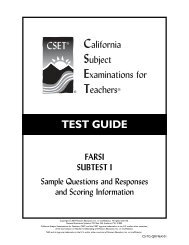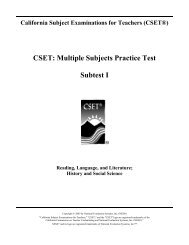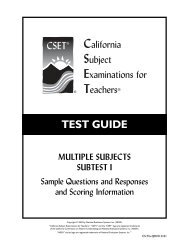TEST GUIDE ENGLISH SUBTEST I - CSETs
TEST GUIDE ENGLISH SUBTEST I - CSETs
TEST GUIDE ENGLISH SUBTEST I - CSETs
You also want an ePaper? Increase the reach of your titles
YUMPU automatically turns print PDFs into web optimized ePapers that Google loves.
28. Read the excerpt below from an essay<br />
by Claude Lévi-Strauss; then answer<br />
the question that follows.<br />
Poetry is a kind of speech which cannot<br />
be translated except at the cost of serious<br />
distortions; whereas the mythical value<br />
of the myth is preserved even through<br />
the worst translation. Whatever our<br />
ignorance of the language and the culture<br />
of the people where it originated, a myth<br />
is still felt as a myth by any reader<br />
anywhere in the world. Its substance<br />
does not lie in its style, its original music,<br />
or its syntax, but in the story which it<br />
tells. Myth is language, functioning on<br />
an especially high level where meaning<br />
succeeds practically at "taking off" from<br />
the linguistic ground on which it keeps on<br />
rolling.<br />
The author's argument in this excerpt best<br />
exemplifies which of the following<br />
structuralist concepts of literary<br />
criticism?<br />
A. The meaning of language resides<br />
not in concrete words and sounds,<br />
but in an abstract deep structure.<br />
B. The binary opposition of<br />
reality/symbolism is a significant<br />
feature of literary works.<br />
C. The chronological order of events<br />
and the sequence in which events<br />
occur are distinct elements of a<br />
narrative.<br />
D. Genre conventions, like codes or<br />
signs, convey meaning independently<br />
of the words in a written<br />
text.<br />
English Subtest I<br />
29. Which of the following best describes<br />
a primary aim of postcolonial literary<br />
criticism?<br />
A. to investigate questions relating to<br />
the cultural differences among texts<br />
B. to analyze ways in which themes of<br />
non-Western texts parallel themes<br />
in the Western literary tradition<br />
C. to consider how various texts<br />
address universal aspects of human<br />
experience<br />
D. to examine factors relating to the<br />
social and political background of<br />
the authors of various texts<br />
California Subject Examinations for Teachers Test Guide 21


